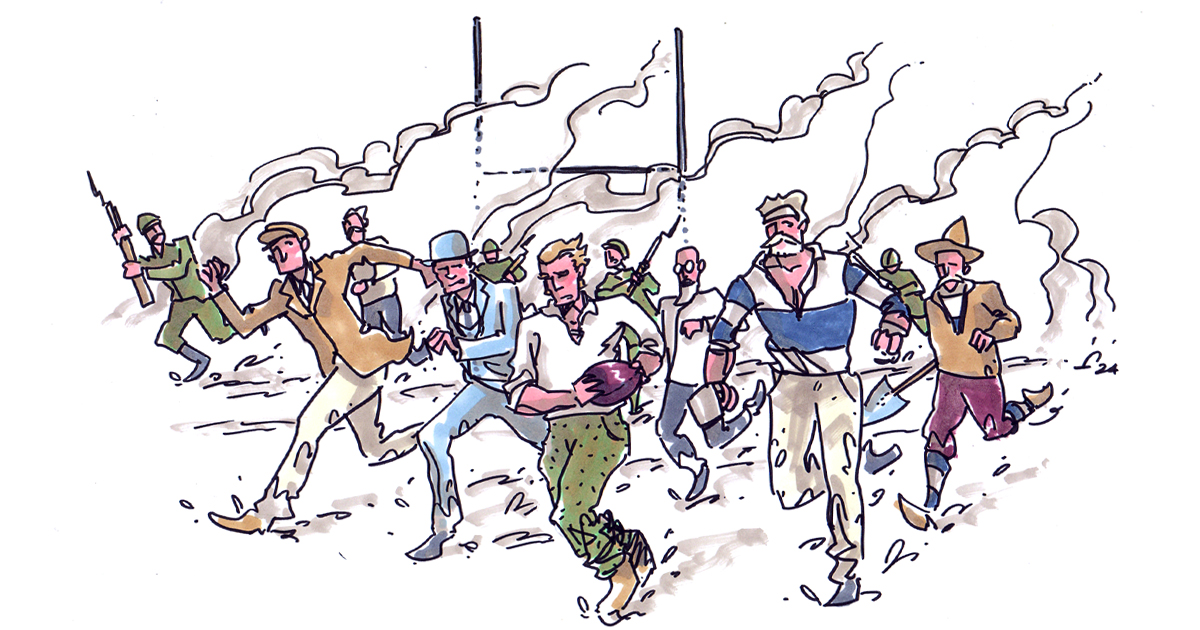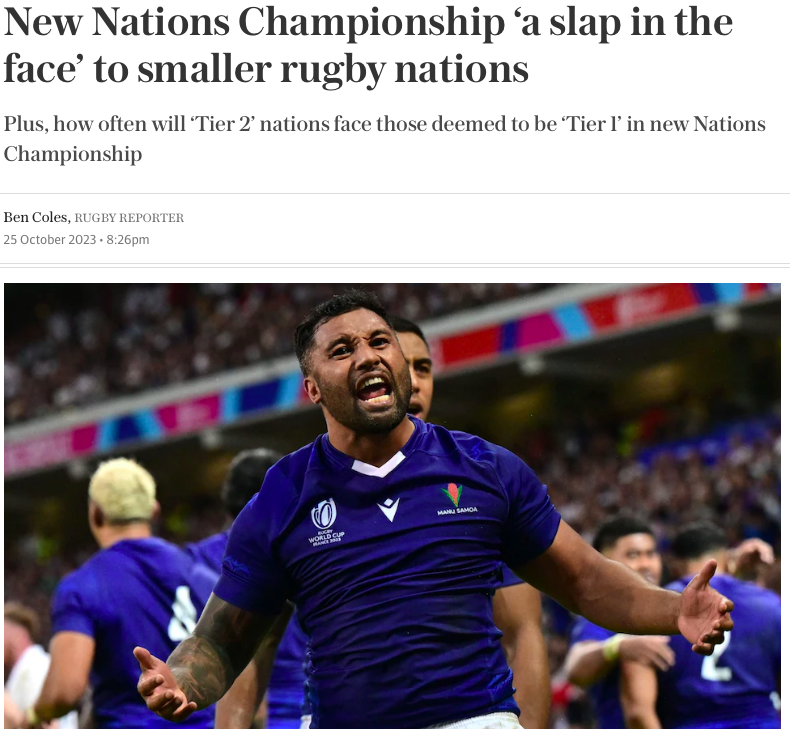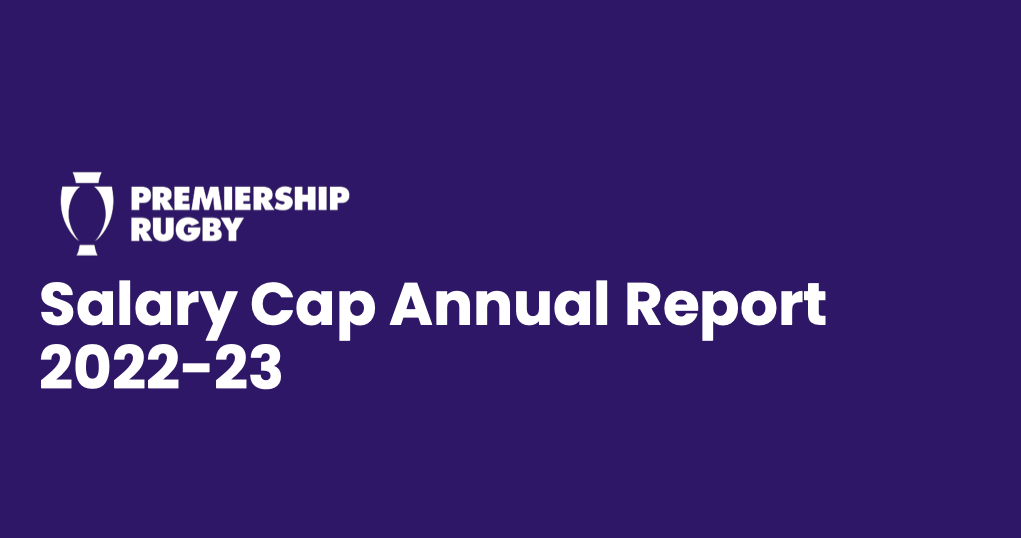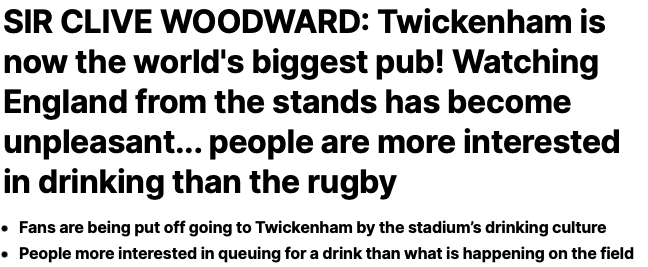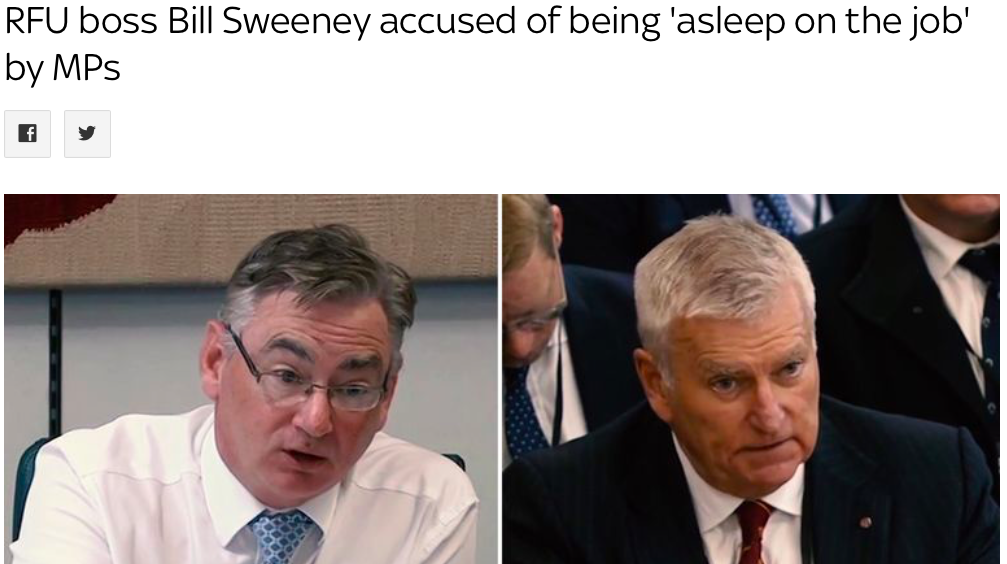This Column has been a fierce critic of how professional rugby union has been run in recent years, even after the investments from Big Finance (PE firms CVC and Silverlake). But the ferocity of those attacks correlates closely to the sadness of how a great sport is, in truth, being messed up.
So, I wanted to write a positive article about rugby.
In 2003, after a stint running Scottish football, I was approached by a headhunter about the CEO role for the Scottish Rugby Union (SRU). After many interviews and presentations, including to a personal hero, Andy Irvine, I was told the job was mine, if I wanted it. I wasn’t sure I did, because the numbers just didn’t add up, and all thinking was around making the asset of Murrayfield pay for itself. Luckily, in hindsight, I was then informed that someone had blackballed me. Maybe, because I was a football guy, or because they found out I was a Catholic. Maybe I was too high-profile up there. Or, maybe, because it was clear things would change too much on my watch.
I dodged that bullet and moved to Como, but I still regret the missed opportunity, because rugby is indeed very special, with unique history and DNA. An example like this from Gareth Edwards can compete with absolutely anything in sport, or elsewhere.
Your eyes feel damp and overflowing, your throat starts to gulp, every single pass singing the names of heroes. It feels like something from the pen of Homer.
Ajax, Achilles, Hector, Ulysses. What a score!
It is truly epic and, for many of a certain vintage, rugby’s true appeal lies exactly in this sporting authenticity of Greece and Corinth. The Rugby Union of our youth, before 1995, was elite amateur, and that absolutely was a key part of its charm.
Maybe, the very essence?
The idea of Hawick farmers, Edinburgh surveyors, Cardiff lawyers, London stockbrokers, French sculptors, and Irish realtors, all having a Saturday alter-ego of poetic violence, was unique and utterly compelling. Rugby Union, after all, is a game for thugs, played by gentlemen with proper respectable jobs. JPR was a normal bloke outside of Saturday. On that pitch, another matter entirely.
One day a week, these unique characters would knock seven bells out of each other in “99” calls of coordinated aggression, where the strong and sturdy would burst their lungs to selflessly “win ball” for their more gifted teammates, fleet of foot and hand. Always moving forward to gain territory, by only passing the ball backwards. The elegance of that idea. A band of brothers in infantry trench warfare, with battles flamboyantly won by the dashing cavalry behind. And when it’s all done, they clap each other off with genuine respect, smiling through their cuts, bruises and broken noses.
All these sporting values are the complete opposite of the capitalism of business and professional commerce. So, for many, the real magic of the Rugby Union of our youth was in this transformation of the amateur Clark Kent into Superman. Nothing to do with money.
I really wanted to write this positive article about rugby.
People these days often ask how long these columns take to do. In truth, the ones around sporting glory write themselves, and the main problem is actually transcribing quickly enough what wants to come out of your head, to do justice to the emotion.
You take a piece of good news, say the English governing body, RFU, delivering a deal around better coordination of the use and cost of players…
The deal is expected to see a split of the RFU’s profits distributed to clubs, with the guarantee of a minimum return. It means that the performance of English national team rugby will play a huge part in determining clubs’ funding, incentivising them to enhance the sport’s commercial revenues with the Federation.
… and you’ve got the basis for a jolly optimistic piece. Throw in the genuine excitement around the imminent final of the club EPCR Champions Cup, and everything can be painted as rosy in the garden. Someone then tells you the sport has 800 million fans worldwide, another waxes lyrical about how countries, like Ireland, with central contracts and Union-owned teams have it all sorted as a model. The flourishing women’s game, the opportunity in the American market. Even the villains of previous Columns and books, CVC, are doing rather well in banging heads together, thinking about newer structures, and common data-based marketing synergies.
Sure, there are issues, but they are all fixable. This is a truly great sport.
Happy days.
I actually did try to write that positive article about rugby.
But that’s when the trouble began with today’s Sunday Column. You speak to people, and the intended narrative starts to lose its way, ironically pretty much like the sport itself. So many folks with very different views. Myriad stakeholders all obviously with completely opposite agendas. How does an outsider, a grubby little football man, analyse all this, absent any authentic feeling for the jealousies or sacred cows, and with no skin in the game?
Baggage-free outsiders actually have an advantage coming at a conundrum, even if they are not the best prepared or most respected voice.
Debating at its best is always about thinking the unthinkable, as it clears the room of the pre-conceived ideas and entrenched positions around the small stuff. It creates a wider context for thought.
And the best way to get attention is always shock.
The fastest way to break-down complex problems is to start by being very radical, look at how people react, and then bring it all back together from the depths of despair.
It’s my “grenade on the Board table” approach to moderating change. And this actually chimes with many of today’s stakeholders in the game, who will all say forcefully, if confidentially, that:
We need to blow everything up.
So, what is rugby’s version of grenade thinking? What would Rugby’s 10th man say?
You’d put this on the table.
Going professional has been a cancer eating away at the soul of the game for 30 years?
The product has subconsciously morphed into what now looks like the riff-raff greyness of Rugby League, and the rules are a confusing abomination.
Rugby League is another code of the game, where players have always been professional and thus, fitter, stronger, and more organised. If you will, more German efficient than Italian beauty and inventiveness, with lines of defensive walls making that game a series of endless tackles and forced kicks ahead.
Sixth tackle coming up.
This version of rugby has never ever offered any real charm, pzazz, and appeal outside of its narrow heartlands in the North of England. And, for the general sports fan, it was merely the filler before the tension of the Grandstand football results at 17.40. It was more famous for its commentator Eddie Waring.
Rugby Union going profession has, to very many, turned it into something very similar to the League product. A bit like Jack Grealish going to City. The flair and excitement have been removed.
Personally, nothing in Rugby League has ever moved me as much as the sight of, say, a blonde “visual artist” from Toulouse turning into the Tasmanian devil after the Marseillaise.
He’s not playing the game for the money, is he? But, you will never ever see sporting commitment greater than this.
Many will utterly reject the idea that the modern game of Rugby Union is an inferior product technically. But – as a state of mind, an idea – nothing compares to the thought of the elite amateur and their unpredictable art. Their blood was for something more than money and TV ratings.
There is no financial business model that makes any sense whatsoever.
“Professional” means making a living out of what otherwise would be a hobby.
So, why should this sport be professional, when anyone who invests in it doesn’t make money, and takes massive losses full-force in the face, like a JPR tackle? From Y11 to CVC, to all the sugar-daddies who finance English and French clubs, they all get “put into touch” sooner or later. Losses are horrendous.
The athletes are getting run into the ground and not even paid well for that risk.
This is how sport works today. Rights holders try to grow revenues and their own power by adding in spurious new competitions, all of which clogs the calendar. The proposed new Nations Championship in rugby is one of those.
More games for players.
What the last 3 years in sport has shown, especially in LIV, is that you need to control the top players, and ideally offer them the “less games, double the money” deal.
The Nations Championship is the exact opposite for this.
The professional rugby players who, by the way, make all this possible, are fed up. Rugby is a hard physical sport, where players shouldn’t really play more than a couple of games a month. But that does not tally with so many owners of leagues and competitions always wanting more and more match-ups, for extra revenues. Players are putting life and limb at risk, and not even getting well paid. 38% of professional players in England earn less than £100k, and 60% earn less than £150k. There are salary caps in place, talk of reduced squad sizes, and anecdotal evidence that players are already seeing the writing on the wall, and going Semi-Pro, finding jobs in the real world. The certainty and quantum of remuneration just aren’t there.
Even on these new hybrid contracts, the devil is in the details.
“Team England Rugby Ltd” are a group of current England players, who are directly negotiating image rights terms, which will be merged into the contracts. They feel that the RFU have been taking more than their fair share of that in the past. These players refused to allow the Rugby Players Association (RPA) to negotiate on their behalf, as the RPA are funded by the RFU.
I was now struggling to write a positive article about rugby.
Professionalism and money have changed everything in Rugby Union, and in these thirty years have left it in a dreadful mess. As a business, and as an ethos. There is just no hiding from that. It’s working for no one. Maybe, not even as a right product for a modern entertainment market in 2024.
So, maybe, this is a sport that just isn’t made to be professional?
Likely not. Time for another grenade.
Rugby Union is ripe for the LIV treatment.
Most of sport’s incumbent leaders have had, and perhaps still have, a total blind spot as to their vulnerability. Especially, when they are not fully serving the interests of their athletes. But when even non-rugby folks, like me, hear rumours of serious people about to leave their jobs to “go and do LIV for rugby”, this means it is imminent.
If anyone thinks that these podcast hosts are randomly pulling ideas and figures out their arse, I have a London bridge to sell you. They have been fully briefed.
Big money from Wall Street or Saudi is about to pounce on a sport whose existing governors are fighting over trivia. I give it nine months max. Don’t say you weren’t warned.
…
So, we’ve thrown a couple of big grenades, and the pieces of the “rugby problem” are lying all over the floor. Time to start putting them back together.
Is it even possible to write a positive article about rugby?
Does it have “value”?
One of rugby’s biggest obstacles is around alignment of interests and incentives. There are just so many different professional stakeholders and governing bodies running siloed parts of the game. In truth, they all detest and distrust each other, and they have actually been killing the sport with the “rugger-bugger” version of Prisoners’ Dilemma. Rather than working together for an optimal outcome, they all move first in selfish naked self-interest. They all want to be important in their own little fiefdom, whilst the whole edifice collapses. Discord and disagreement are everywhere, usually based around money.
No one can argue with this last paragraph.
It’s all a bloody mess.
So RFU CEO, Bill Sweeney, deserves some credit in delivering what seems to be the first signs of joined-up thinking in the sport, in England. This is a welcome positive for him after he got what is called, in common parlance, a “kicking”, in front of a government Select Committee. They blamed him for the bankruptcy of some storied club teams like Wasps. He replied, paraphrasing, that club solvency wasn’t necessarily his job.
This internecine warfare, sometimes calculated, often merely petty, is at every level, but it is most easily seen in the club versus country dynamic. This is sport’s classic Achilles heel, also for soccer. But, whereas the club game in football dominates the attention and the commerce, it doesn’t in rugby. The international game, mainly the Six Nations (6N) in Europe, is where the attention and money is. The clubs (in England) employ the players, but that gives them no real say in matters of HR around their athletes. The infamous Reg 9 is adopted by all the major Rugby Unions and it mandates player release for sanctioned international games during certain windows.
So, for example, in European rugby, the 6N at the start of every year absolutely cripples fan interest in the club game, which then has to try and market their product, not even knowing if their star players will be available. They also don’t know in which physical and athletic condition their employees will return. How do you market the club game on that basis? It’s set up to fail.
What really prevents me writing a positive article about professional rugby?
There are just too many structural problems with the product market/fit and the business value-chain.
1) There is no model that in any way makes commercial or marketing sense for an investor in the club game as it stands.
You play a distant second fiddle to the national game, but you still need to pay for the players. Even if you don’t control when you get to use them, or how to keep them healthy. Without significant coordinated financial subsidy from the Union like, say, in Ireland, independent club rugby just can’t work.
2) There is very little fan support for anything below the international game.
England is the world’s biggest rugby market and, thus, the best datapoint to make the point. They say, that there are 10 million rugby fans in the country, but only 1.5 million of them are down as interested in the club game.
That means you have 8.5 million of what some call “Big Eventers”. English rugby union is a Southern thing, mainly a Home Counties thing, and London people want to brag socially over Pimms that they were at Twickenham. Like they were at Henley, or the Albert Hall, or Glyndebourne, and even Chelsea FC these days. These people cannot be counted on to support the club game, as they aren’t fan(atic)s.
They are the social butterflies of everything the leisure calendar has to offer in a world-class city, like the capital. Clive Woodward drops the truth bomb on these “customers”.
The hardcore 1.5 million fans of the club game, those who are meant to be the lifeblood for the clubs and their professional owners, is a tough demographic. They are often insular, stagnant and off-putting to many (as Woodward says). Male pale and stale. Think Harry Enfield.
Good parody and caricature, like Enfield here, are always exaggerated extensions of reality, and this is true for club rugby fans. They represent a small cadre of white males of a certain age, and social background, glorying in their bad behaviour as a badge of honour. Pass the aftershave.
3) To date, there is no evidence of any enlightenment on how to market the club game, and this is exactly where CVC is trying to help.
Three clubs went under in 2022 and not a single one of the survivors has since reduced prices, that I can see. Tickets remain stubbornly very expensive, where the cost of season-books is set so high that it just makes more sense to cherry-pick matches, and that is what people tend to do. They will wait to see if the best players are going to be turning out for their team, or off with England. Or injured after the wars of the test matches.
The product is oversupplied with no concept of the NFL principle of scarcity.
So, the ticketing slice of the revenue cake for club rugby is undercooked, and no one is succeeding in really trying to convert those 8.5 million drunk Big Eventers, who turn up to Twickers. If you even got 20% (of those) more committed to the club game, you would double the fanbase. How many people under 30 are motivated to follow rugby? How many girls or C2DEs? And how many Asians and blacks?
4) The golden years of rugby’s media dollar are over.
Broadcasters are on their uppers and need to make savings. Their rugby deals, especially for club rugby, are going to be one of the first to come under scrutiny, as it doesn’t really move the needle for new subscribers or in preventing churn. It’s just a “nice-to-have”. The marketplace can see that playing out already at the various governing bodies in the game, be that EPCR, PRL, URC. Rugby needs to face into the fact that the B2B broadcast dollar is now only going one way, and it isn’t north.
5) Rugby complacent relationship with sponsorship is not a given.
The sport is fragmented across so many different TV platforms, that no one really knows when and where rugby is on, and it’s falling between the stools of popular culture and attention. Sponsors will notice. Nice middle class values, and hoping that the right sort of chap sees your brand, will only go so far. Rugby doesn’t tick so many of the requests of the modern sponsor checklist. It isn’t inclusive, it doesn’t have rich data on its customer base, it seems a bit “Crusty Colonel” from The Telegraph. It’s also losing all those wonderful sporting values that made it unique: professional players are becoming more “thuggish” and less “gentlemanly”. And sponsors never like getting close to businesses that are clearly a financial basket case, owned by some “bad ‘uns”, in the club game.
6) Club rugby’s product market/fit is weak.
There is no real sporting jeopardy in England and it is now in effect a closed league, with no promotion or relegation, and where almost all clubs qualify for European competitions (EPCR) automatically. Few club rugby games are mass-market “must-watch”.
7) Pathways are often non-existent.
How many get a chance to even play rugby? To actually participate? Because fandom comes in the main from participation. The pathways in England are now almost exclusively fee-paying schools, where ironically rich nanny middle-class parents are increasingly put off by the concussion narratives. So, they ain’t growing a fanbase that way either? In Ireland and South Africa maybe, in England…
… No!
…
If Bill Sweeney was accused by the politicians of living in an ivory tower, it’s because it doesn’t take a genius to see any of this, and he is the chief of the game’s overarching governing body. Bucks tend to stop there.
But I will write a positive article about rugby!
The international game sells out stadia and commands attention, especially the 6N. The Lions are a golden brand. The women’s game is coming. And let’s take as money-good that there are indeed 800 million people worldwide keen on the sport. That’s more than the NFL.
The top end of the club game has legs, if structured properly. Leinster v Toulouse is going to be epic.
The people very interested in creating a LIV for top rugby, a superleague of clubs, is good validation of this being a sport of the future. The Irish and Springbok model, whilst not perfect, gives real cause for belief that the governance, over-supply of games, player fatigue, problems can be structured to work better.
This is a sport with “value” certainly at the top end, and that is why CVC had a punt. Without much intelligent thought, granted, but they correctly saw an upside if things could be structured differently.
There are three possible outcomes as I see it:
The Irish model applied globally.
The super league model.
Fuck it, let’s go back to elite amateurism.
Irish eyes are smiling.
Benchmarking in business or sport is about looking to the best of breed, and asking how they do things, and get around obstacles. In this case, club versus country.
Irish rugby is universally considered that benchmark, with excellent international teams and their four regional club sides out-performing in their league, the URC, and in Europe/EPCR. So, let’s ask that question: how do they do it?
Very simply, everything is owned by the Union. There is no other stakeholder. The players are employed by the Union and play in clubs owned by the Union. There is what is called central control, where elite talented players are saved to play on only the biggest of games, so their fitness and sharpness are managed, to peak at the right time. There is no outside club investor/owner with a different agenda. The regionals clubs are also pretty successful due to clear and traditional identity, and no real competition from soccer in Ireland. Player pathways are coordinated and functioning, via schools, colleges and provisional academies.
But, even here, opinion is not aligned.
Many will point to three out of the four provinces not doing particularly well, and “ the sport is surviving on government bail-outs and one-off CVC money”. This seems a bit harsh but indeed the IRFU itself is forecasting a loss of €10 million in ’23/’24.
It’s not throwing off cash the way a professional business should. Let’s be honest.
And this is best-in-breed. Don’t look at all at the financial numbers in Scotland, another country with the central model (but with only 2 regional teams, whose identity pales in comparison to the old amateur club brands north of the border). Welsh rugby, with private club owners, is bleeding out in front of our eyes, and they hope for a merger with the English league. But we shouldn’t forget that old business axiom: merging two bad businesses never makes a good one. And, by God, English club rugby is a bad business. They are dying off like flies.
French clubs and their Union work much more hand-in-glove, also knitted closer together with the community and local businesses. Clermont is owned by Michelin. Local authorities do the usual French dirigisme thing and support key industries, of which rugby is one, especially in the South of France. Loads of votes for politicians in helping rugby in some part of France. So, they are deeper of pocket and can attract the best players, also from England.
The Southern hemisphere has pluses and minuses. The Boks and their rugby pathways are admirable. Silverlake dropping serious wedge into the All Blacks isn’t.
Rugby, for what is a nice-to-have second tier sport, hasn’t got its s*** together on a global holistic basis. And that’s a serious problem.
The conclusion is that the current structures and business model for rugby as a professional business do not work; not even close.
Indeed, the only glue for European rugby union seems to be the much-maligned CVC. The PE firm has invested in the English club game, URC (Italy, Ireland, Wales, Scotland, South Africa), 6 Nations and, indirectly, in the Lions. They are trying to bang heads together for improvement, hoping to eliminate the dilemma of prisoners, but they only have minority stakes and no real power. Ultimately, they will want and need to merge all these bodies for some kind of chance of a coordinated strategy. But that’s turkeys and Christmas. There are a lot of blazers who will tend to resist that, one suspects. Their entire raison d’être is always self-preservation.
Without the CVC capital, this sport in Europe would likely already be back to being amateur. Bill Sweeney deserves great credit for managing to get hybrid contracts through. But it’s all a day late and a dollar short.
The Barbarians are already at the gate.
The Super League model, funded likely by Saudi, would create a dozen or so club teams (8 men, 4 women) from around the world, with the top 300 players. It would have to be a breakaway league, and older rugby fans will remember what happened in 1995 when similar threats surfaced. A deal with World Rugby will be done, and CVC and Silverlake would likely push for that also. The Unions will squeal.
P.S. the PE money looking at investing into South African rugby should listen to the podcast on the Super League before they cut a cheque.
Below these twelve global mega teams, from Rio, to Tokyo, via London, Paris, Auckland, Edinburgh and Dublin, there likely won’t be any other professional version of the game. It will be local, amateur, and pathway. Ironically, much like the times when Andy Irvine and Fergus Slattery were kicking about.
“Semi-pro” is a sugar-coated way to say “amateur”, for those who like to be less controversial.
In the end, I did write a positive article about the future of rugby.
It is bright. It just won’t be structured as today. Many many blazers and committees will need to go. Investors, who made investments to date, will need to take losses and just get over it.
The sport will provide a great living for 300 players, and generate loads of money in the international and mega-club game. Unions will be given their trickle-down share to help the amateur local game, and especially to build pathways. They will all need money to work better on preventing concussion. And those rules need to be clarified for a normal person to follow.
Yes, all that is preventing rugby securing its future as a great sport are today’s governance structures, old-fart mentality, and the lack of bravery to realise that most of the game should return to Corinth.
They’ll be raising a glass down in the taverns of Gala tonight.

To order the Limited Edition of Roger Mitchell’s book “Sport’s Perfect Storm“, click here and fill the form.
Listen to our “Are you not entertained?” sports management podcast here.
To find out what we do in change management, have a look here.
For our C-suite management services, read here.
Here you can know more about our content development work.
Discover our Corporate Learning service.
Get to know more our “Sport Summit Como” yearly sports management event here.
If you want to read our own story, go here.


